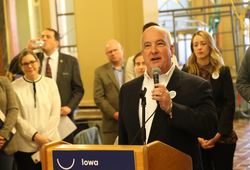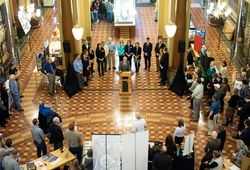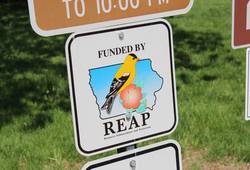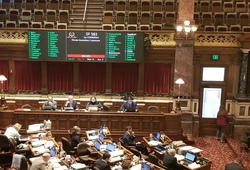2020 Legislative Session – Victories in Challenging Times
posted
by Angelisa Belden on Friday, June 26, 2020
 Iowa’s 2020 Legislative Session will go down in history as one filled with promise, but ultimately fraught with uncertainty, change, and strangely enough, status quo. There was promise in the Governor’s Invest in Iowa Act. Clean energy received meaningful and positive action. The Governor signed historic legislation on police reform. But when the dust of the frantic final weeks settled, many things remained the same: no felon voting rights. Continued focus on abortion access. No new money for natural resource efforts.
Iowa’s 2020 Legislative Session will go down in history as one filled with promise, but ultimately fraught with uncertainty, change, and strangely enough, status quo. There was promise in the Governor’s Invest in Iowa Act. Clean energy received meaningful and positive action. The Governor signed historic legislation on police reform. But when the dust of the frantic final weeks settled, many things remained the same: no felon voting rights. Continued focus on abortion access. No new money for natural resource efforts.
When the session came to a close on June 14, many things looked different than expected at the start of the year. January opened with excitement as the Governor pledged funds for IWILL, Iowa’s Water and Land Legacy. Our water program staff dug into this historic opportunity, providing draft bill language and making recommendations to the Governor’s team on ways to improve the policy for the benefit of Iowa’s natural resources. Late February we saw the fruit of months of effort by the energy program to build a net metering coalition for solar customers with the successful passage of SF 583.

As IEC members and supporters crowded the Rotunda of the Capitol for Environmental Lobby Day on March 11, attendees and legislators were cautious but not overly concerned about Covid-19. By the following Monday, however, the state legislature suspended all activity. The next eleven weeks were a time of waiting and watching as health officials and state leaders focused on keeping Iowa safe.
The Legislature resumed June 3 with a goal of a short session to finalize a FY 2021 budget and wrap up any important loose ends. Twelve days later they closed a rapid-fire session marked by lots of action, but limited public access.

IEC supporters and members remained engaged throughout, taking action when asked and doing their part to keep environmental issues part of the discussion. There were some important wins.There were some losses. And there were some actions that will wait to be debated for another year. Here is a look at some of the activity affecting Iowa’s natural resources and clean energy economy:
WINS

REAP – Extending and funding the Resource Enhancement and Protection program was a high priority this year, as the program had a sunset date of 2021. IEC took an active role, meeting with legislators and calling on our supporters to take action in the final weeks of the session to ask legislators to extend the sunset date and fund REAP for FY 2021.
We succeeded by working closely with Representative Mommsen to extend REAP funding for two more years at the status quo appropriation of $12 million. This extension gives Iowa communities resources for improvement projects and gives IEC more time to continue conversations about a longer term solution.

Protecting Iowa Solar (SF 583) - On March 12, 2020, Governor Reynolds signed SF 583. In 2019, IEC and our partners dubbed an effort by the utilities to stop customer-owned solar as the “Sunshine Tax”. It failed to advance. In the eight months that followed, we worked with our allies to negotiate something that is rarely achieved: legislation with unanimous support from both political parties in both houses of the legislature.
Senate File 583 puts net metering into Iowa law for the first time, creating certainly over state-level solar policy for the next decade. We are excited about the long-term potential for this law to open up and stabilize the market for solar in the areas of Iowa served by MidAmerican and Alliant Energy. The new law officially takes effect on July 1, 2020. Learn more.
Water quality appropriations - A status quo budget for DNR was viewed as a win, with additional funds appropriated in specific areas of Lake Restoration & Water Quality ($8 million) and Water Trails ($250,000). HF 2642, Rebuild Iowa Infrastructure Fund (RIIF) Appropriations, also included funds for the Water Quality Initiative under the IDALS budget ($5.2 million), and Renewable Fuels ($3 million). Recreational trails under the DOT budget saw an appropriation of $1 million. Further investment in lake water quality was also added through amendment S-5159 by adding $600,000.
Energy Building Code Restrictions – SF 2372 would have restricted the State’s ability to adopt new building energy efficiency codes by imposing inappropriate cost-effectiveness tests and creating other hurdles to requiring more efficiency in new and updated buildings. The bill passed a Senate Committee but was never brought to the full Senate for a vote.
Hemp legislation – The passage of HF 2581 was a moment of bi-partisan support passing 48-1 out of the Senate. The bill now headed to the Governor's desk allows hemp and CBD products to be sold in the state legally under the bill's guidelines.
LOSSES
IDALS bill – SF 2413, also sometimes called the Ag Gag law, included an amendment to make trespass onto food operations property an aggravated misdemeanor for the first offense and a class D felony for a second offense.
HOLDS
Invest in Iowa Act – Governor Reynold’s kicked off her Condition of the State address in January by announcing a tax package based on raising the sales tax by a penny to fund the Natural Resources and Outdoor Recreation Trust Fund. The first 3/8ths of a cent would go to the trust; the remaining dollars raised would be used to fund mental health and other projects. IEC was supportive of funding the trust, with a focus on maintaining the integrity of the original formula. In March, IEC members attended a series of Town Halls across the state hosted by the Governor to gain a better understanding of her policy and share their thoughts. Unfortunately, once COVID-19 struck and budget concerns took priority, the Invest in Iowa Act was shelved for the year. IEC stands ready to continue this work in the FY 2021 session.
Bottle Bill – It was no surprise to see several “bottle bill” related suggestions to update the 1979 law raised this session. HF 2534, which proposed broadening containers accepted at grocery stores and redemption centers and increase the one-cent handling fee, received the most traction. The bill and its Senate companion advanced to the Ways and Means Committees but stalled there. The legislature’s “pause” substantially limited the debate around this longstanding complex policy issue. Included in the Governor’s March 17 Order was relief for grocery and convenience stores to temporarily refuse bottles and cans. This order remains in place at this time.
Prior to Covid-19, the Iowa Grocery Industry Association filed a petition with DNR in an attempt to redirect can and bottle returns to recycling and redemption centers. The request seeks to remove a requirement to have an advance agreement between redemption centers and a store requesting services. It prohibits redemption centers from deducting a one-cent handling fee from the deposit refund, which is illegal under the current law. While any store that sells beverages must take them back, many small retailers refuse to do so and direct customers to grocery stores for redemption. The petition requires uniform enforcement of the requirement and demands that the DNR and Attorney General enforce existing provisions. It also allows grocery and convenience stores to divert containers to approved redemption centers within 15 miles--an update to the current 10–minute drive requirement. The petition has not moved forward due to a pause in DNR’s action due to Covid-19.
Statewide Renewable Energy Siting – Legislation to change how utility-scale wind and solar projects are sited was introduced in the Senate as SSB 3128, but did not advance beyond a subcommittee.
For more information on bills adopted this Session that will impact Iowa’s natural resources and clean energy leadership, see our final bill summary on our 2020 legislative session page.
- iowa legislature
- reap
- water quality